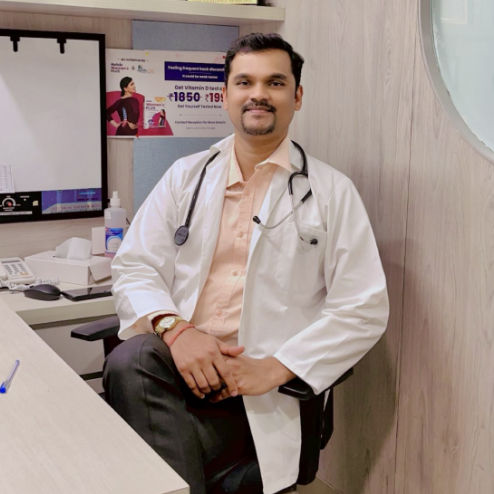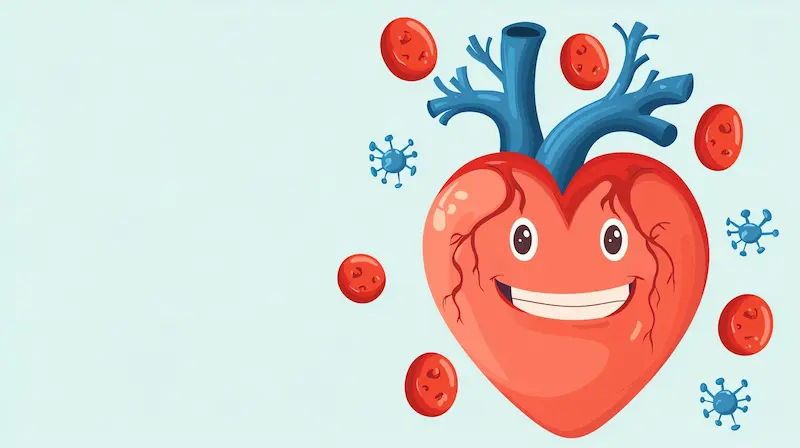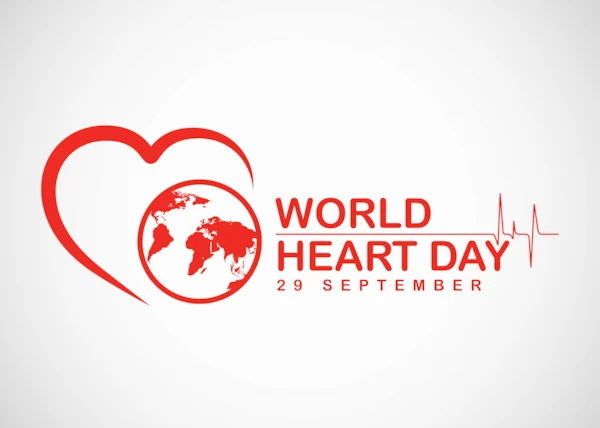Guide to Usg Ivf Treatment Women Heart Disease Practice Caution
Women with heart disease should approach IVF treatment with extra care. Learn how ultrasound-guided IVF (USG IVF) works, potential risks, and safety tips for a heart-healthy fertility journey.

Written by Dr. Dhankecha Mayank Dineshbhai
Reviewed by Dr. Vasanthasree Nair MBBS
Last updated on 13th Jan, 2026

The journey to parenthood through In Vitro Fertilization (IVF) is a profound one, filled with hope and careful planning. For women living with heart disease, this path requires an additional, critical layer of caution and specialized care. The significant hormonal changes and physical demands of IVF can place substantial stress on the cardiovascular system. This guide is designed to empower you with knowledge, outlining the essential steps—from the initial USG scans to the final embryo transfer—to ensure your safety and well-being throughout the process. By understanding the risks and implementing a meticulous, collaborative care plan, you can navigate your IVF journey with greater confidence and security.
Understanding the Intersection of Heart Disease and Fertility
For any woman, IVF is a physically demanding process. For a woman with a pre-existing heart disease, it's crucial to understand how the treatment interacts with her condition. The goal is not to discourage but to prepare and protect, ensuring the mother's health is the top priority.
How Heart Conditions Can Impact a Woman's Reproductive Health?
Certain heart disease can affect fertility directly. Conditions that cause chronic low oxygen levels in the blood (cyanotic heart disease) or severe heart failure can disrupt the menstrual cycle and reduce blood flow to the ovaries and uterus, potentially impacting egg quality and the chances of successful implantation. Furthermore, the medications used to manage cardiac conditions sometimes need to be reviewed for their safety during a potential pregnancy, adding complexity to the pre-conception planning phase.
Why IVF Demands Extra Caution for Cardiac Patients?
IVF involves artificially manipulating the body's natural hormonal environment to stimulate the ovaries to produce multiple eggs. This leads to two primary concerns for cardiac patients:
1. Fluid Shifts and Blood Volume: The high estrogen levels from ovarian stimulation can cause the body to retain fluid, significantly increasing blood volume. For a healthy heart, this is manageable. For a compromised heart, this extra volume can lead to pulmonary edema (fluid in the lungs) or worsen heart failure symptoms.
2. Increased Risk of Blood Clots: Both pregnancy and IVF treatments elevate the risk of thrombosis (blood clots). Women with certain heart disease, like atrial fibrillation or mechanical heart valves, may already be on blood thinners, making management during IVF a delicate balance.
The Crucial Role of Pre-IVF Cardiac Evaluation (USG and Beyond)
A thorough pre-IVF assessment is non-negotiable. This goes far beyond the standard fertility workup and involves a close collaboration between your fertility specialist and a cardiologist experienced in managing pregnancy after heart surgery or with complex conditions.
Standard Pre-IVF Ultrasound (USG) Scans
The baseline transvaginal USG is a cornerstone of fertility assessment. It evaluates the health of your ovaries (antral follicle count), uterus, and endometrial lining. For all women, this scan checks for any anatomical issues that might impede pregnancy. In your case, it provides a baseline that helps the fertility specialist tailor your stimulation protocol to avoid excessive ovarian response, which can worsen fluid retention.
Essential Advanced Cardiac Tests Before Starting IVF
Your cardiologist will likely recommend tests to get a precise picture of your heart's function under stress. These may include:
Echocardiogram: An ultrasound of the heart to assess its structure, function, and valve health.
ECG (Electrocardiogram): To check your heart's electrical activity and rhythm.
Stress Test: To see how your heart performs under physical exertion.
Blood Tests: To check biomarkers like BNP (B-type Natriuretic Peptide), which can indicate heart strain.
This comprehensive evaluation helps your medical team answer the critical question: "Can my heart safely handle the demands of IVF and a subsequent pregnancy?"
Navigating the IVF Process with a Heart Condition
Once cleared for treatment, your IVF cycle will be carefully managed with your cardiac health in mind at every stage.
The Stimulation Phase: Managing Medication and Fluid Shifts
Your fertility specialist will likely opt for a "soft" or low-dose stimulation protocol to prevent Ovarian Hyperstimulation Syndrome (OHSS), a condition characterized by severe fluid retention that is particularly dangerous for cardiac patients. Close monitoring with frequent USG and blood tests is essential. If you experience sudden weight gain, significant swelling, or shortness of breath during this phase, contact your doctor immediately. For urgent concerns, you can consult a cardiologist online with Apollo24|7 for prompt advice.
The Egg Retrieval Procedure: Anesthesia and Stress on the Heart
Egg retrieval is a minor surgical procedure. The main concerns are the anesthesia and the brief physiological stress. It's vital that your anesthesiologist is aware of your cardiac history. They will choose the safest anesthesia plan and monitor your vital signs closely throughout the procedure to ensure stability.
Embryo Transfer and the Two-Week Wait: Minimizing Emotional Stress
While physically less demanding, the emotional stress of the two-week wait after embryo transfer can be significant. Stress can elevate blood pressure and heart rate. Prioritizing stress-management techniques like mindfulness, gentle walking (if approved by your doctor), and talking to a counselor is a key part of your care plan.
Consult an General Physician
Special Considerations for Different Types of Heart Disease
Guidance for Women with Congenital Heart Disease
Women who have repaired or unrepaired congenital conditions require highly specialized care. The risk of passing on the condition to the child, while often low, should be discussed with a genetic counselor. The ability of the heart to handle pregnancy depends on the specific defect and the success of any past repairs.
Managing Acquired Conditions like Hypertension or Arrhythmias
For conditions like hypertension, the focus is on achieving excellent blood pressure control before starting IVF. Medications may need to be switched to ones safer for pregnancy. For arrhythmias, the goal is to maintain a stable rhythm and have a plan in place to manage any episodes that might occur during treatment.
Building Your Dream Team: Cardiologist, Fertility Specialist, and You
The most critical element for a safe IVF treatment is a collaborative, multidisciplinary team. Your fertility specialist and cardiologist must communicate openly to create a unified plan. You are the central member of this team. Do not hesitate to ask questions, voice concerns, and ensure all professionals involved are fully aware of your complete medical history. Regular monitoring is key, and Apollo24|7 offers convenient home collection for routine blood tests to track your health throughout the process.
Conclusion
Embarking on an IVF journey with a pre-existing heart disease is a path that demands courage, meticulous planning, and unwavering support. While it presents unique challenges, these challenges are not insurmountable. The key lies in thorough preparation, from the initial USG* scans to advanced cardiac testing, and in assembling a dedicated medical team that prioritizes your cardiovascular health at every step. By taking a proactive and informed approach, you can significantly reduce risks and create the safest possible environment for pursuing your dream of motherhood. Remember, this journey is about your health as much as it is about building your family. Open communication with your doctors and trusting your instincts are your greatest assets. Take the first step today by scheduling consultations with your specialists to create a personalized plan that puts your heart first.
Consult an General Physician
Consult an General Physician

Dr Vinay Kumar A V
Nephrologist
8 Years • MBBS, MD - General Medicine, DM - Nephrology
Bilaspur
Apollo Hospitals Seepat Road, Bilaspur

Dr. Ajay K Sinha
General Physician/ Internal Medicine Specialist
30 Years • MD, Internal Medicine
Delhi
Apollo Hospitals Indraprastha, Delhi
(200+ Patients)
Dr Prachi Sankhe
General Physician/ Internal Medicine Specialist
8 Years • MBBS, MD (Internal Medicine)
Mumbai
Apollo Hospitals CBD Belapur, Mumbai

Dr. Hariprasath J
General Physician/ Internal Medicine Specialist
19 Years • MD (Gen Med), FCCP, Dip (Diabetology, UK)
Chennai
Apollo First Med Hospitals P H Road, Chennai
(225+ Patients)

Dr J Kushal
General Physician
10 Years • MBBS
New Delhi
Apollo One Pusa Road, New Delhi
More articles from Heart disease
Frequently Asked Questions
1. Can I ever be denied IVF treatment because of my heart condition?
Yes, it is possible. A fertility clinic may advise against IVF if a thorough cardiac evaluation determines that the treatment or a subsequent pregnancy would pose an unacceptably high risk to your life. This is a medical decision made for your safety.
2. What is the most dangerous part of IVF for someone with heart disease?
The ovarian stimulation phase is often considered the most risky due to the potential for significant fluid shifts and increased blood volume, which can strain a compromised heart. The egg retrieval procedure also requires careful anesthetic management.
3. Should I consider a frozen embryo transfer (FET) instead of a fresh transfer?
Often, yes. A frozen embryo transfer allows your body to fully recover from the stimulation cycle, letting your hormone levels and fluid balance return to normal. This 'freeze-all' strategy is commonly recommended for women with heart disease to reduce immediate cardiovascular stress.
4. Are there specific IVF protocols for women with high blood pressure?
While there isn't one universal protocol, your doctor will likely choose a stimulation protocol that minimizes the risk of OHSS and uses the lowest effective dose of medications. Excellent blood pressure control before and during the cycle is paramount.
5. How long after heart surgery should I wait before trying IVF?
This varies greatly depending on the type of surgery and your recovery. It's essential to get clearance from your cardiologist, who will assess your cardiac function and stability. This waiting period could be anywhere from several months to a year or more.



